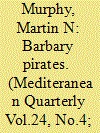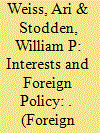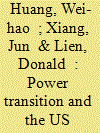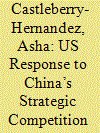|
|
|
Sort Order |
|
|
|
Items / Page
|
|
|
|
|
|
|
| Srl | Item |
| 1 |
ID:
126676


|
|
|
|
|
| Publication |
2013.
|
| Summary/Abstract |
This essay describes the piracy that took place in the Mediterranean from the time of ancient Greece to Barbary. It explains the corso, the sea war between nonstate but state-endorsed Christian and Muslim parties, with reference to the Knights of Malta and, more extensively, the Barbary corsairs. Although the essay focuses primarily on history, it also draws some conclusions about piracy and the international system today. The essay notes a prevailing assumption that contemporary piracy off Somalia and that perpetrated by the Barbary pirates is similar, but it further notes that any similarities are slight and superficial. At the same time, similarities rooted in economic, social, and political change do exist between all outbreaks of depredation at sea and the responses to them.
|
|
|
|
|
|
|
|
|
|
|
|
|
|
|
|
| 2 |
ID:
152890


|
|
|
|
|
| Summary/Abstract |
In this article, we test one explanation of the causes of adoption of destabilization as a foreign policy. Destabilization, a risky policy which targets the political leadership of another sovereign state, is a widely-used foreign policy practice. But under-conceptualization, specifically around the causes of destabilization, has thus far limited its use in scholarly analysis of foreign policy. This paper aims to remedy that deficiency. Building on Taliaferro's (2004) balance-of-risk theory, we examine the rapid decay and adoption of destabilization in relations between the US and Cuba as a critical empirical test of this theory. We argue that the risky decision to adopt destabilization is the result of perceived crisis of security, economic and ideological interests. Our findings have implications for other scenarios and times, because they provide a better understanding of destabilization as a practice of governments against one another.
|
|
|
|
|
|
|
|
|
|
|
|
|
|
|
|
| 3 |
ID:
174854


|
|
|
|
|
| Summary/Abstract |
Many scholars have examined how the United States should respond to a rising non-democratic China. Contrary to the well-debated hard power domain, little attention has been devoted to China’s soft power. This study is arguably the first to systematically investigate the US response to the establishment of Confucius Institutes—China’s global initiative to expand soft power. We argue that the US decision to establish Confucius Institutes is influenced by both macro- and micro-level variables. At the macro-level, as suggested by the power transition theory, the United States is more likely to accommodate Confucius Institutes when China shows a higher level of satisfaction with the United States. At the micro-level, US universities and state governments host Confucius Institutes due to budget saving and community engaging. Our analysis sheds light on how the United States makes trade-offs when confronting China’s expanded soft power, and it provides yet another prominent example of money buying influence in international relations.
|
|
|
|
|
|
|
|
|
|
|
|
|
|
|
|
| 4 |
ID:
192572


|
|
|
|
|
| Summary/Abstract |
The 2022 National Security Strategy (NSS) released by the Biden/Harris administration calls for the United States to “out-compete” China, to reintegrate the Middle East, and to refurbish US global leadership, in part by regenerating America’s technological and economic advantages that help to attract allies and partners. While these types of strategic documents are often seen as aspirational, when it comes to US policy in the Middle East and North Africa, the NSS reiterates what has already been the guiding directives for US policy in this region since 2021.
|
|
|
|
|
|
|
|
|
|
|
|
|
|
|
|
|
|
|
|
|